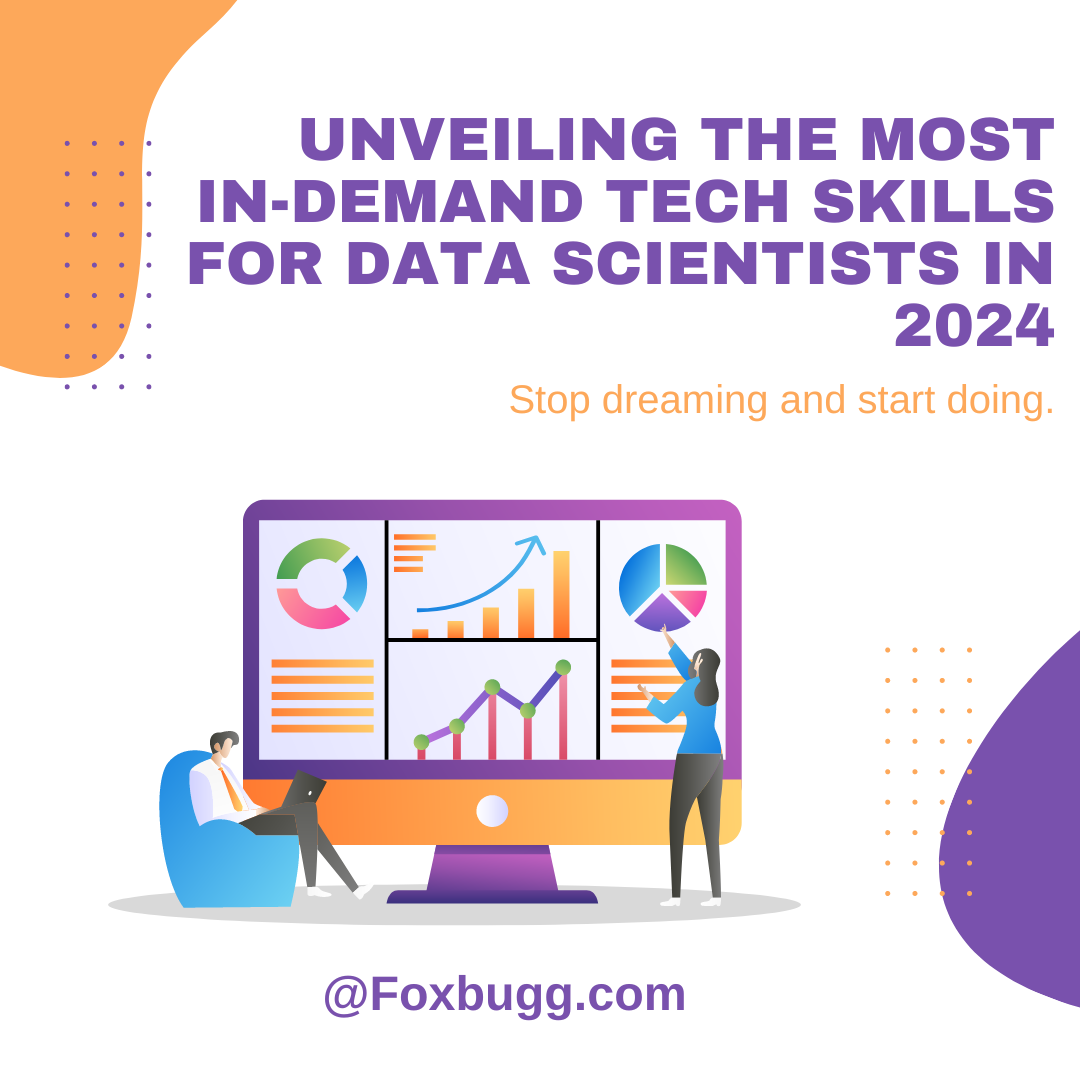Introduction:
As we step into 2024, the field of data science continues to evolve, driven by rapid advancements in technology and an ever-growing demand for data-driven insights. In this dynamic landscape, data scientists are at the forefront, tasked with deciphering complex datasets to extract valuable knowledge. To navigate this realm successfully, professionals must equip themselves with the most in-demand tech skills. In this article, we will delve into the key technological skills that are expected to be crucial for data scientists in 2024.
1. Machine and deep learning:
Machine Learning (ML) and Deep Learning (DL) are fundamental to the field of data science, and their importance is only likely to increase. Proficiency in machine learning algorithms, including supervised and unsupervised learning techniques, is required. Furthermore, an in-depth knowledge of neural networks, particularly deep neural networks, will be required to handle difficult tasks such as image and voice recognition.
2. Programming Languages:
Several programming languages have become synonymous with data science, and mastery of these is vital. Python remains the language of choice for many data scientists due to its versatility, extensive libraries (e.g., NumPy, Pandas), and readability. R is another language that continues to be relevant, particularly in academic and statistical contexts. Moreover, familiarity with languages like Julia and Scala can offer a competitive edge in specific domains.
3. Data Visualisation Instruments:
For data scientists, properly communicating complex findings is a critical skill. Professionals may produce eye-catching visual representations of data insights with the help of data visualisation tools like Tableau, Power BI, and Matplotlib. Being proficient with these tools helps with data pattern exploration and interpretation as well as improving the communication of discoveries.
4. Big data technologies:
Being able to handle and evaluate large-scale datasets is essential in the big data era. Effective handling of large data now requires the use of technologies like Apache Spark and Hadoop. To get valuable insights from big, complicated datasets, data scientists must be skilled at using these technologies.
5. NLP,natural language processing:
A branch of artificial intelligence called natural language processing gives robots the ability to comprehend, interpret, and produce language that is similar to that of humans. The amount of unstructured data is growing, making NLP abilities more and more valuable. An awareness of transformer models such as BERT and GPT, along with proficiency in libraries such as spaCy and NLTK (Natural Language Toolkit), can lead to a variety of applications, ranging from language translation to sentiment analysis.
6. Platforms for Cloud Computing:
The method of storing, processing, and accessing data has changed as a result of the cloud migration. Data scientists must be conversant with cloud computing systems like Google Cloud Platform (GCP), Microsoft Azure, and Amazon Web Services (AWS). These platforms provide numerous services designed specifically for data science workflows along with scalable infrastructure.
You should also read our another blog that’s mentioned below :
Top 10 Blockchain Courses and Certifications for Beginners in 2022
7. Cybersecurity and Data Privacy:
As data becomes increasingly valuable, safeguarding it becomes paramount. Data scientists need to be cognizant of cybersecurity practices and data privacy regulations. Understanding how to implement secure data pipelines and ensuring compliance with regulations like GDPR (General Data Protection Regulation) is crucial for ethical and responsible data science practices.
8. Reinforcement Learning:
While supervised and unsupervised learning dominate, reinforcement learning is gaining traction, especially in applications like autonomous systems and robotics. A solid understanding of reinforcement learning algorithms and frameworks such as OpenAI’s Gym is becoming a sought-after skill for data scientists venturing into dynamic decision-making scenarios.
9.Statistical Analysis and Mathematics:
Data science heavily relies on statistical analysis and mathematical concepts to draw meaningful insights from data sets. These skills form the backbone of various data modeling and analysis techniques.Statistical proficiency involves understanding and applying statistical methods to analyze and interpret data. This includes measures of central tendency, dispersion, hypothesis testing, and regression analysis.
10. Cutting Edge Computing:
By processing data closer to the source, edge computing avoids depending entirely on centralised cloud servers. With the proliferation of the Internet of Things (IoT), data scientists will need to be prepared to handle edge computing difficulties. Proficiency in the deployment and optimisation of models for edge devices can be quite helpful, particularly in situations where processing in real-time is essential.
11.Time Series Analysis:
Time series analysis is a specialized field within data science that revolves around understanding and interpreting data points collected over time. In this context, ‘time series’ refers to a sequence of data points indexed in chronological order. These data points can represent measurements, observations, or any other quantifiable information recorded at regular intervals.
12. Technology of Blockchain:
Beyond cryptocurrency, blockchain technology is becoming more and more influential in data security and transparency. Data scientists may find themselves well-positioned for emerging positions that require secure and impenetrable data systems if they are familiar with the fundamentals of blockchain technology and its potential uses in validating and safeguarding data transactions.
In conclusion
The most in-demand tech skills for data scientists in 2024 span a broad spectrum, reflecting the multidisciplinary nature of the field. As technology continues to advance, data scientists must stay agile and continuously upskill to remain at the forefront of this dynamic and evolving landscape. Whether it’s mastering advanced machine learning techniques, harnessing the power of big data, or navigating the intricacies of data privacy, a diverse skill set is the key to success in the realm of data science.
You can also read this article
Python vs javascript? Which is the best programming language for beginners in 2022

